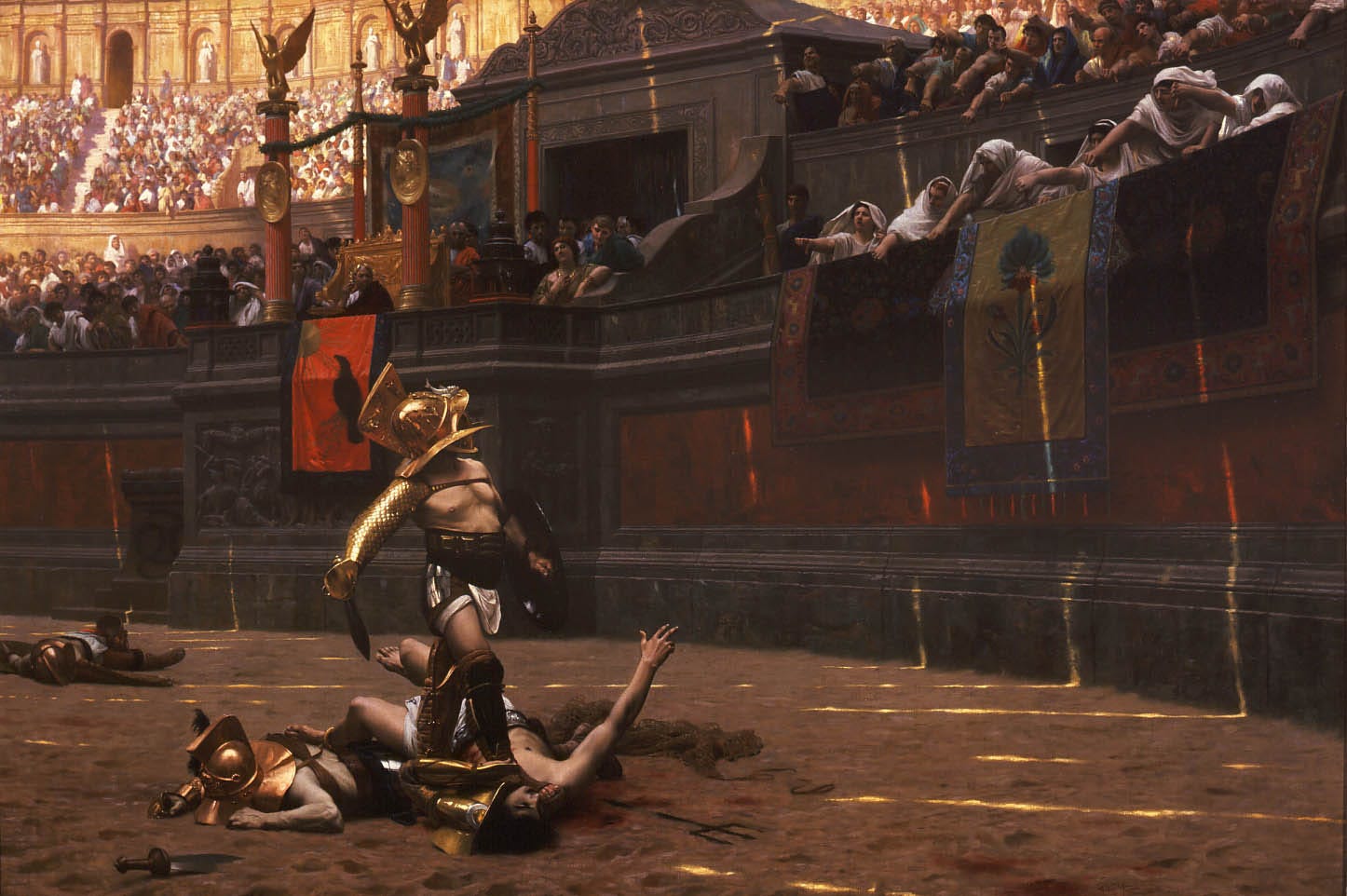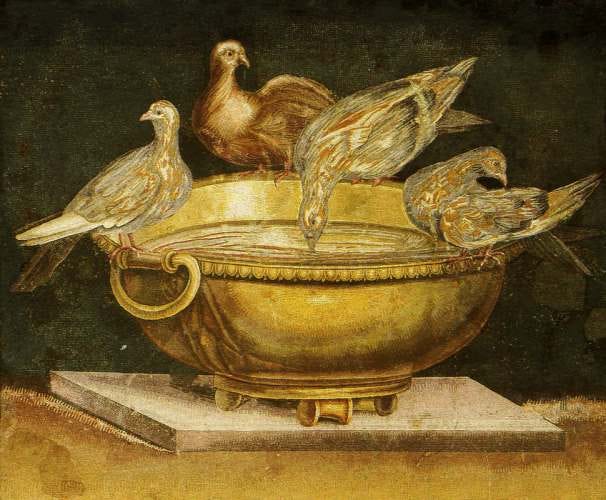Virtual Violence, Real Peace
A defense of virtualism
The violence and sex in modern film are edited to seem real – they don’t start from reality.
Of course, sometimes there are hints that there are real people behind the acting. Some punches are real. Actors are injured for the art. MMA fighters and other athletes risk their wellbeing for their craft, but the worst tragedies are the result of accidents, not design.
In contrast, popular Roman entertainment could be sharply cruel. Writing in 179 AD, Tertullian said:
For we have seen an actor truly suffer castration in personating the god Atys of Pessinus; and another playing Hercules in real flames; and among the ludicrous barbarities which are exhibited at noonday, for the entertainment of those who are more greedy of them than dinner.
Needless to say, our mass entertainment is not the same. It does not reach a level of gore that ancient events could. With technological progress, there’s less need to hurt others. Nonetheless, we maintain a fascination with the violence in the ancient world – at once macabre and glorious.
From staged battles involving deadly combat to the slaughtering of exotic animals, popular entertainment consisted in real death. While we insist that no animals were harmed, the Romans and others in antiquity did not even insist that no humans were harmed.
The games were abhorred by a number of well-known Romans – but the criticism tended to focus on the malice of the crowd, not the rights of the participants. For example, here’s Seneca:
There is nothing so ruinous to good character as to idle away one's time at some spectacle…
The other day, I chanced to drop in at the midday games, expecting sport and wit and some relaxation to rest men's eyes from the sight of human blood. Just the opposite was the case. Any fighting before that was as nothing; all trifles were now put aside - it was plain butchery… Unhappy as I am, how have I deserved that I must look on such a scene as this? Do not, my Lucilius, attend the games, I pray you. Either you will be corrupted by the multitude, or, if you show disgust, be hated by them.
What Seneca primarily objects to is the character of the participants. Elsewhere, he holds up the gladiatorial oath, the most “disgraceful compact”, as the model attitude towards death. Cicero too praises the games as a way to exemplify courage against death. He mentions that some Romans looked down on the combat as “cruel and inhuman” and lamely concludes that “it may be so.”
There were a number of reasons why people viewed the games, gladiatorial and otherwise. Some for moral lessons – the games could exemplify courage and glory or the just deserts delivered to criminals. Others for sport – there’s no doubt that the physicality and athleticism of the participants could be so impressive at such high stakes. And still others for spectacle. The relationship between the sacrificed and society was complex. The gladiator was at once despised, destitute, and a demigod. The classicist Carlin Barton gets at this when speaking of the gladiator:
In one framework he was a victim, under the direst compulsion; in the other a redeemer, both of himself and his audience. To understand the Roman gladiator one has to live, as did many Romans, in both these worlds.
A redeemer who provided diversion to Rome’s lower classes, providing an escape from their ordinary lives. And, yet, a slave.
The Value of Violence
There’s an appeal to authentic violence. Probably because there’s an appeal to authenticity as such.
To be clear, there’s a difference between the suffering of a voluntary participant and that of the enslaved charioteer or actor. An accident in the case of the former has a different color than the suffering of the latter. There’s nothing appealing about the sad cases Tertullian described.
The Roman admiration for the few who put their lives at risk freely is more relatable.
The athlete who plays through their injury is praiseworthy – motivation can be built from stories like that. If the deed is heroic enough, it can make myths. There’s something admirable about having skin in the game.
Meaning is proportional to risk – so taking part in dangerous activities can animate a life. Witnessing others' risk then is a matter of witnessing something that matters. Risk is bound up with sacrifice – another fount of meaning. To quote the philosopher Roger Scruton at his most religious and mystical:
When someone enters the moment of sacrifice, throwing away what is most precious, even life itself, for the sake of another, then we encounter the supreme moment of gift. This is an act in which the I appears completely. It is also a revelation. In sacrifice and renunciation the I makes of its own being a gift, and thereby shows us that being is a gift. In the moment of sacrifice people come face to face with God.
Behind this theoretical explanation of the value of violence is something more primitive. The sort of thing that causes William Broyles Jr, a US Marine who fought in Vietnam, to describe war as “an affair of great and seductive beauty.”
It’s not just the act of voluntary participation in the games that was celebrated. It’s causing bloodshed. Whether or not the root of the desire is culturally or biologically programmed, there’s a near-universal, if shameful, recognition that war and war games are fun. They can also be tragic, cruel, and meaningless. Another Christian critic of the games, Cyprian, complained that the gladiators boasted of their miseries and fought with the wild animals and other men out of madness.
William Broyles Jr. gestures at that madness here:
The line between life and death is gossamer thin; there is joy. true joy, in being alive when so many around you are not. And from the joy of being alive in death's presence to the joy of causing death is, unfortunately, not that great a step.
It’s difficult to know how to relate to this.
The Decline of Violence
With the rise of less deadly sports and stronger states, violence in entertainment has diminished. With the recent emergence of e-sports, digital celebrities, and stronger safety norms the trend has accelerated. Technological and cultural progress has moved our worlds into the represented and imaginary. Blood in movies is fake. Fights are no longer to the death.
Instead, blood is painted by programs. Cinematic torture scenes can be safely streamed from one’s living room – and the participants will be paid professionals joining voluntarily.
Traditionalists may mourn the last stages of bullfighting or the newest safety regulations, physical conflict is bound to move off the mainstream.
Despite the allure, it’s hard to see any appeal in the extent of typical Roman spectacle. It’s just not worthy of modern civilization. Our cultural age is less visibly violent. This goes not just to entertainment, but for society at large.
Races are much safer than charioteering. Political violence is relatively rare. Although a direct comparison with Rome is difficult, we do not lose 5,000 athletes a year in any of our sports stadiums.
But there are reasons to be skeptical of this narrative of progress.
One may argue that the violence has become hidden. The bull is moved from the bullring to the feedlot. Instead of throwing criminals to the beasts a la poena cullei, we throw them, in large numbers, into cages.
There’s something to this. The most painful costs of entertainment and pleasure are pushed to the least powerful. For Romans, that may have been slaves, foreigners, and criminals. An entirely cynical reading of Rome would have it be an imperialistic slave-state with a non-trivial amount of capital punishment and torture.
Are we so different? The answer to this question must be yes – there’s an incredible gulf between attitudes concerning bloodshed in antiquity and today. But one can’t become complacent or sanctimonious about the gap. Today the worst punishments are still pushed to the least powerful: foreigners, criminals, and animals. These classes are also the least visible. Violence against foreigners is less nakedly imperialist, but it cannot be ignored. With more than 4,000 deaths in 2018, the number of people who die in prisons per year in America may rival the number of yearly deaths in the coliseum. Most of these deaths are natural, but it’s also true that a year of prison is associated with a two-year drop in lifespan. Finally, the violence developed states inflict on animals today in factory farms renders the Romans relatively enlightened.
There are other skeptical stratagems, for instance, one may argue that the decline in physical conflict is a short-term mirage. A trend waiting to be broken by World War III. There’s something to be said for this line as well. Forecasting the future from current trends seems naive. Plausibly, the trend is good for individuals, but not civilization.
Nonetheless, an individual’s chance of succumbing to violence is arguably lower than it has ever been. We don’t share the same permissiveness towards casual cruelty.
This isn’t to single out the Romans. Public executions have been fodder for entertainment for centuries. The state has only just begun hiding executions from the public. Many other ancient societies included barbaric bloodshed in their entertainment, religion, and politics.
Though our world is less physically violent, social malaise may come in novel forms. Social media enables the largest mobs the world has ever seen. There’s a suspicion that we’ve moved away from shaping the atoms to moving bits. There’s the expectation to be online all the time.
Compared with antiquity, these social malaises are relatively tame. Marc Andreesen has said that these complaints are a form of reality privilege:
A small percent of people live in a real-world environment that is rich, even overflowing, with glorious substance, beautiful settings, plentiful stimulation, and many fascinating people to talk to, and to work with, and to date... Everyone else, the vast majority of humanity, lacks Reality Privilege -- their online world is, or will be, immeasurably richer and more fulfilling than most of the physical and social environment around them in the quote-unquote real world.
With relative prosperity, technology, and new norms we can substitute the suffering slave with software. And the unprivileged can have their needs for violence and sacrifice met through the virtual medium. Netflix, Youtube, and Epic play the role of satisfying the masses who lack reality privilege. Although it can be common to criticize the virtualization of modern life and its apparent lack of authenticity, this critique is hollow when we realize that digital life may be preferable to the mundane life of atoms. Or, to be more precise, that the augmented experience the virtual affords is preferable to the unaugmented hum-drum life of the median American.
In addition to their violence, Romans were able to ground their success and magnificence in the real world too. See the beauty of their architecture. And the sacrifice in their more admirable moral tales.
While proclaiming the virtue of skin in the game, Nassim Taleb noted:
Less than a third of Roman emperors died in their beds — and one can argue that given only few of these died of really old age, had they lived longer, they would have fallen to a coup or in battle.
There’s room to quibble here – but the general principle seems correct. The Roman elites, voluntarily or not, put their life at risk in a way no elites do today.
One framing of this is that the lack of skin in the game is a mark of social cowardice. Another is that it’s a benefit of a less violent world. Similarly, one can criticize virtualization as inauthentic. But this misses the mark when the authentic is anodyne.
Real Peace
Suppose we wanted to create a society with less violence. One could remove the desire for violence or satisfy it in some other way.
The desire for violence may have biological roots. It’s hard to say. Strictly speaking, that seems unlikely to me. More likely, the extent of violence is entailed by more basic parts of human machinery and the historical environment. Even if there were biological roots, the fact that something is biological does not entail that it is necessary. Nature can be transcended.
One of the best ways to remove the desire for violence would be to decrease its value. Violence in antiquity was seen as more glorious than it is today because martial virtue was good for people and societies. At least, it served their self-interest. Only the violent survived. The value of violence was reinforced and driven by cultural practices, like the games. As that attitude becomes less useful, it becomes less popular.
That’s the material and cultural explanation for the value of violence.
There’s a more rationalist explanation, favored by people like Steven Pinker, that explains progress, in part, due to the fact that societies are, on a whole, smarter and can reason more abstractly. Smarter individuals tend to be more cooperative and, on the whole, less violent.
It’s likely that violence will never lose all of its value (unless, very speculatively, we become non biological beings). So, another way to manage this is to substitute for physical violence. Robert Nozick had the thought experiment of the happiness machine:
Suppose there was an experience machine that would give you any experience you desired. Super-duper neuropsychologists could stimulate your brain so that you would think and feel you were writing a great novel, or making a friend, or reading an interesting book. All the time you would be floating in a tank, with electrodes attached to your brain. Should you plug into this machine for life, preprogramming your life experiences?... Of course, while in the tank you won't know that you're there; you'll think that it's all actually happening... Would you plug in?
One could imagine satisfying our most vicious impulses virtually. Video games and film are primitive attempts at that. Instead of celebrating violent war games, substitute by streaming ever safer sport.
Pure substitution is not enough. There must be intellectual, cultural, and political incentives against violence. But substitution can be an important stratagem.
Nonetheless, describing the virtual as substitution underplays its role. The virtual world isn’t merely a stand-in for the physical world, it’s an augmentation of the world. Satisfying the need for violence doesn’t entail creating crude games and films. Instead, it’s a matter of enabling meaning, status, and sacrifice in the virtual, and thereby actual, world.
It’s better to be violent in bits than atoms. There are reasons to be skeptical about the virtual world, but one shouldn’t become too enamored with the physical. Simulated violence is one way to buy peace, without better angels.




